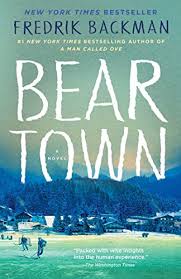Content warning: The book discussed centers around an instance of rape.
There are books that you read, then forget. And there are books that stay with you.
Beartown is one of the latter. This beautifully written book follows several residents of a hockey-crazed Swedish small town. It’s the kind of town that’s been ravaged by big businesses swooping into nearby towns. “You can’t live in this town,” they say. “You can only survive it.”
The town’s only source of pride is its hockey teams, which have faded in relevance over the years — except this year, when the junior team is good enough to make the semifinals thanks to a team built around a star player, Kevin, and a supporting cast that complements him well. But then Kevin rapes the GM’s daughter after the semifinal, and everyone in town is affected.
Beartown’s catalytic event doesn’t happen until nearly halfway through the 400-page book. This made it a bit hard to get into at first — but it was well worth it at the end, when the painstaking development of all the book’s main characters made it nearly impossible to put the book down. Every character is nuanced, and author Fredrik Backman wrote them in such a way that nearly every action is understandable, even if clearly not justified.
Backman’s writing is lyrical and full of ruminations on the meaning of hockey, family, life and loyalty. The natural flow of the writing is even more impressive considering the book is a translation from its original Swedish. Beartown also distinguishes itself from most sports books in that Backman clearly knows and loves hockey. The descriptions of the games read like they were written by a sports writer, and Backman also clearly understands the meaning of sports — and the way they can both bring people together and tear them apart.
Some books that deal with sexual misconduct come off as preachy; others are too dismissive. Beartown was neither. Backman handled the subject with empathy for the victim while also exploring the actions of those around her, both good and bad, and the forces pushing them to act certain ways. Hockey is the backdrop to all of this; in a place where the hockey team is one of the few sources of hope in Beartown and the junior team’s coaches have always stressed that the team comes before all else. That makes the fallout particularly devastating. In a town where hockey is everything, its citizens are forced to grapple with the dark side of both the game and human nature itself.
I love sports. But I’ve also seen the ways the same culture that makes them so appealing can also turn toxic, the way sports are sometimes used as an excuse to enable the horrific. In that way, Beartown was both timely and realistic. The events of Beartown are fictional, but they feel like they could happen — have happened — in so many different places.
The ending of Beartown was unpredictable and affecting. (I’ll admit I cried.) Few things in the book are as simple as they seem, and that extends to the ending. Beartown is dark, but it is ultimately hopeful. It was a poetic and poignant read that I wanted to keep reading after it was over. I know I won’t stop thinking about it anytime soon.


